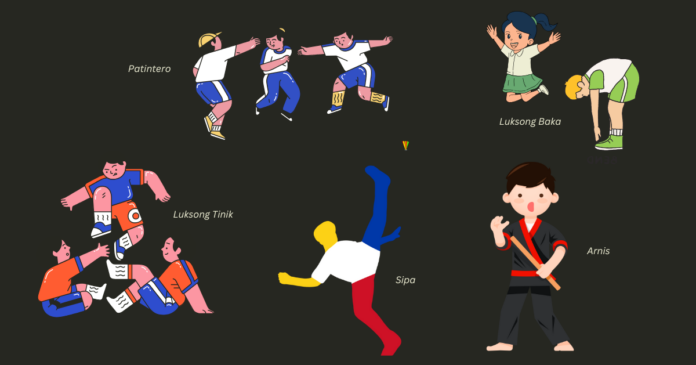When it comes to sports, the Philippines digs deep into its culture with a colorful athletic heritage that dates back to pre-colonial times. From the casual and fun sipa to self-defense tactics offered by 𝑎𝑟𝑛𝑖𝑠, even indigenous games like 𝑝𝑎𝑡𝑖𝑛𝑡𝑒𝑟𝑜, 𝑙𝑢𝑘𝑠𝑜𝑛𝑔 𝑏𝑎𝑘𝑎, and 𝑡𝑢𝑚𝑏𝑎𝑛𝑔 𝑝𝑟𝑒𝑠𝑜, these activities are embedded in our identity as Filipinos and transported those who have experienced them into a world of fun, fair play, and a happier youth.
The Roles of Philippine Sports
The Philippine sports culture is more than just about games that kids of old usually play on the streets. Rather, it redefined an era when the outside world was our playground: a time when the youth looked forward to spending the whole afternoon with their friends, playing despite the heat and rain and not minding that they were sweating or going home with wounds and scratches.
To say the least, sports and games were part of our tradition even before the arrival of Spanish and American colonizers. These activities, as seen through the eyes of our ancestors, were done as part of their rituals or as a showcase of their talents.
Our mindset when it comes to sports was transformed when foreign settlers reached the shores of the Philippines. Europeans brought with them the emerging popularity of horse racing and football, while the Americans, particularly the military, taught boxing and baseball to the natives. The Young Men’s Christian Association (YMCA) was also instrumental in introducing basketball and volleyball.
While modern sports overlapped our interest in traditional games, it gave us new perspectives of the future of the Filipino spirit in national and international competitions, paving the way for athletes like Pancho Villa (boxing), Teofilo Yldefonso (swimming), Lydia de Vega (athletics), Efren Reyes (billiards), Manny Pacquiao (boxing), and Chito Loyzaga (basketball) to raise the Philippine flag on a global sporting scale.
On the other side, indigenous games are still being played today. Fiestas and other celebrations, especially in the many provinces of the country, make these activities as highlights, giving participants and spectators a glimpse of the past and a sense of community.
Modern Sports for the Modern Filipinos
Sports evolved when technology paved new ways for Filipinos to thrive in the digital world. Professional gaming and eSports became an instant hit with the youth, while others continued to enhance their skills in traditional sports with the help of innovative methods. Athletes became better in their disciplines through modern coaching, training, and equipment.
Be that as it may, running and triathlon took a stand and pushed their advocacy for a shift in lifestyle, overall physical fitness, and mental well-being.
Running has bloomed into a once niche sport for the physically fit into a fitness revolution, with many Filipinos entering their so-called “running era.” With the sport’s accessibility and rise in popularity, running groups opened their doors to runners of all shapes and sizes and an inclusive community where beginners and veterans run together.
Triathlon, meanwhile, is the ultimate test of strength, stamina, and endurance. Triathletes have to go through rigorous training and discipline to attune their mind and body to overcome swimming, cycling, and running. It is both a physical and mental battle that pushes Filipino athletes to their limit and a strong commitment to a healthy and active lifestyle.
Best of Both Worlds
The evolution of sports in the Philippines is an indication that athletes are willing to embrace the future. This, however, doesn’t mean that it aims to replace traditional games. For one, arnis is making a name as a premiere martial arts discipline, tapping a broader audience, while some organizers also include traditional games in their events as a promotion.
The spirit of competition burns bright in the Filipino athlete. Running and triathlon encourage participants to persevere, work together as a team, and celebrate victories together.



